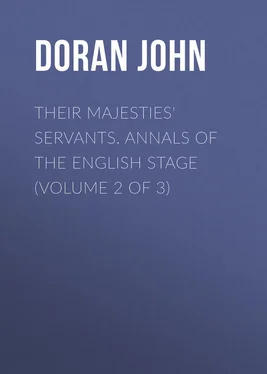John Doran - Their Majesties' Servants. Annals of the English Stage (Volume 2 of 3)
Здесь есть возможность читать онлайн «John Doran - Their Majesties' Servants. Annals of the English Stage (Volume 2 of 3)» — ознакомительный отрывок электронной книги совершенно бесплатно, а после прочтения отрывка купить полную версию. В некоторых случаях можно слушать аудио, скачать через торрент в формате fb2 и присутствует краткое содержание. Издательство: Иностранный паблик, Жанр: foreign_antique, foreign_prose, на английском языке. Описание произведения, (предисловие) а так же отзывы посетителей доступны на портале библиотеки ЛибКат.
- Название:Their Majesties' Servants. Annals of the English Stage (Volume 2 of 3)
- Автор:
- Издательство:Иностранный паблик
- Жанр:
- Год:неизвестен
- ISBN:нет данных
- Рейтинг книги:4 / 5. Голосов: 1
-
Избранное:Добавить в избранное
- Отзывы:
-
Ваша оценка:
- 80
- 1
- 2
- 3
- 4
- 5
Their Majesties' Servants. Annals of the English Stage (Volume 2 of 3): краткое содержание, описание и аннотация
Предлагаем к чтению аннотацию, описание, краткое содержание или предисловие (зависит от того, что написал сам автор книги «Their Majesties' Servants. Annals of the English Stage (Volume 2 of 3)»). Если вы не нашли необходимую информацию о книге — напишите в комментариях, мы постараемся отыскать её.
Their Majesties' Servants. Annals of the English Stage (Volume 2 of 3) — читать онлайн ознакомительный отрывок
Ниже представлен текст книги, разбитый по страницам. Система сохранения места последней прочитанной страницы, позволяет с удобством читать онлайн бесплатно книгу «Their Majesties' Servants. Annals of the English Stage (Volume 2 of 3)», без необходимости каждый раз заново искать на чём Вы остановились. Поставьте закладку, и сможете в любой момент перейти на страницу, на которой закончили чтение.
Интервал:
Закладка:
The force of the two theatres will be better understood, perhaps, if I show the exact amount of the opposition brought to bear against each other. Garrick's Richard was met by that of Ryan; the Lord and Lady Townley of Garrick and Mrs. Woffington, by those of Ryan and Mrs. Horton; the Hamlet and Ophelia of the former two, by those of Ryan (and afterwards of Sheridan) and Mrs. Clive. Garrick and Mrs. Giffard, in "Macbeth," were opposed, first by Quin, then by Sheridan and Mrs. Pritchard, who played everything, from the Thane's wife to Kitty Pry. To oppose to him an amateur, like Highmore, in Lothario, was absurd; Quin's Lear had no weight against the mad old king by his young rival; and Mrs. Charke's Plume, one of the many male characters which Cibber's daughter loved to play, was pale, compared with that of the universal actor.
All the above were honourable competitors; but there also appeared this season an actor, who became Garrick's personal enemy – namely, Foote. The latter commenced his career at the Haymarket, February 6, 1744, as Othello, to the Iago of Macklin, who had opened that house with a "scratch company," including "pupils" – while he was disengaged at Drury Lane. Foote also played Hamlet, 41 41 It is extremely improbable that Foote was the unnamed "Gentleman" who played Hamlet on this occasion.
to the Ghost and First Gravedigger of Macklin; and did not find his vocation, as he thought, in such parts as Lord Foppington.
At both patent houses the "Beggars' Opera" was produced; at Drury, the Macheath and Polly were Blakes and Miss Budgell, an illegitimate daughter of Eustace Budgell; at the Garden, Cashell's Macheath gave way to that of Beard, while the Polly and Lucy of Kitty Clive and Mrs. Pritchard, at the same theatre, charmed the auditors for a time, and gave them pleasant memories for a long period to come.
The literature of the stage did not make progress this season. Classical Cooke selected an assize case of murder in Kent, and spoiled its terrible simplicity in his "Love the Cause." To Havard's cold, declamatory tragedy, "Regulus," Garrick gave warmth and natural eloquence; but even his Zaphna, admirable as it was in "Mahomet," would not have saved the Rev. Mr. Miller's adaptation from Voltaire, had that part of the public who hated the adapter, known to whom they were indebted for it. Miller ended his uneasy life, during the run of the play, a representation of which, after his death, contributed a hundred pounds to the relief of his widow and children.
In the season of 1744-45, the old opposition was feebly sustained on the part of Covent Garden, but with some novelty appended – especially in the case of a ballad-singer like Cashell, attempting Hamlet against Garrick! 42 42 Cashell's Hamlet was a personal eccentricity on his benefit night; not an attempt on the part of the theatre to oppose Garrick.
Further, the King John of the latter in Shakspeare's play was opposed to old Cibber's alteration of the same piece, produced at Covent Garden, as "Papal Tyranny," in which Quin played the King, and toothless, nerveless Cibber, Pandulph. The indulgent audience pitied the quavering old player.
Garrick's King John was a fine, but not the most perfect of his performances; he was happy in such a Constance as Mrs. Cibber. Quin congratulated himself on having such a Hubert as Bridgewater, the ex-coal-dealer. The value of Cibber's mangling of Shakspeare, got up to abuse the Pope, because of the Pretender, may be conjectured by a single instance – that John is too shy to hint at the murder of Arthur till Hubert has "shut the window-shutters." The modesty of the mangler may be more than guessed at from the fact, that Cibber – in his own words – "endeavoured to make it more like a play than I found it in Shakspeare!"
Quin, to witness his rival's impersonation of Othello to the Iago of Macklin, went to Drury, in company with Bishop Hoadley's son, the doctor. Foote, in the previous February, had announced that his Othello would "be new dressed, after the manner of his country." Garrick, on his entrance, looked so ill in Quin's jealous eyes, that he compared him to Hogarth's black boy, and said to Hoadley, "Why doesn't he bring in the tea-kettle and lamp?" Great as Quin was in mere declamation, Garrick excelled him in the address to the senate. 43 43 Very doubtful. The statement rests on Victor's authority.
Victor describes the falling into, and the recovery from, the trance, as "amazingly beautiful;" but he honestly told Garrick that the impersonation was short of perfection. Murphy states that Garrick had the passions at command, and that in the sudden violence of their transitions he was without a rival.
Garrick attempted Scrub with less success, and Quin had no reason to be disquieted by his rival's Sir John Brute. Quin's Othello was a favourite with the town; but in that part Garrick had a more formidable rival in Sheridan, and the most formidable in Barry. The only original character he played this season was Tancred, in Thomson's "Tancred and Sigismunda," a play too sentimental and stilted, too poor in incident, and too little varied in character, in spite of its occasional richness and sweetness, to interest an audience, in these days. It was otherwise, at the time of its first appearance, when with Garrick, Tancred; Sheridan, Siffredi; Delane, Osmond; and Mrs. Cibber, Sigismunda; the town sighed, wept, and moaned over the love trials of the celebrated pair. Garrick's Tancred is warmly eulogised by Davies, who describes Garrick and Mrs. Cibber as "formed by nature for the illustration of each other's talents. In their persons," he says, "they were both somewhat below the middle size. He was, though short, well made; she, though in her form not graceful, and scarcely genteel, was, by the elegance of her manners and symmetry of her features, rendered very attractive. From similarity of complexion, size, and countenance, they could have been easily supposed brother and sister; but in the powerful expression of the passions, they approached to a still nearer resemblance. He was master of all the passions, but more particularly happy in the exhibition of parts where anger, resentment, disdain, horror, despair, and madness predominated. In love, grief, and tenderness, she greatly excelled all competitors, and was also unrivalled in the more ardent emotions of jealous love and frantic rage, which she expressed with a degree of sensibility in voice, look, and action, that she never failed to draw tears from the most unfeeling."
A change of proprietorship in the Drury Lane patent afforded Garrick an excuse for repairing to Dublin. His rival, Sheridan, invited him, not concealing his dislike, but professing readiness to meet all his requirements. With some difficulty the terms were arranged, and Garrick appeared in various characters, alternating them with Sheridan, and playing frequently with a new actor, young Barry, who was afterwards to become the most dreaded and the most brilliant of his rivals.
For a long series of years the Irish stage had been, with rare exceptions, in a pitiable condition. At one time three houses were open, with a public only sufficient for one. Managing committees of noblemen made the confusion worse confounded, and seven managers, known as the "seven wise men," only exhibited their folly and incapacity. There were performers of merit at from twelve shillings to a guinea a week, who seldom obtained half their salaries. On one occasion, we hear of the acting managers coming down to the theatre, one evening, when, on comparing notes, they were all found to be dinnerless, for want of cash and of credit. With the first money that was paid at the doors they obtained a loin of mutton, with the next they sent for bread, and with a third supply they procured the generous beverage they most required; and then dined behind the scenes while the performance was in progress.
Читать дальшеИнтервал:
Закладка:
Похожие книги на «Their Majesties' Servants. Annals of the English Stage (Volume 2 of 3)»
Представляем Вашему вниманию похожие книги на «Their Majesties' Servants. Annals of the English Stage (Volume 2 of 3)» списком для выбора. Мы отобрали схожую по названию и смыслу литературу в надежде предоставить читателям больше вариантов отыскать новые, интересные, ещё непрочитанные произведения.
Обсуждение, отзывы о книге «Their Majesties' Servants. Annals of the English Stage (Volume 2 of 3)» и просто собственные мнения читателей. Оставьте ваши комментарии, напишите, что Вы думаете о произведении, его смысле или главных героях. Укажите что конкретно понравилось, а что нет, и почему Вы так считаете.












